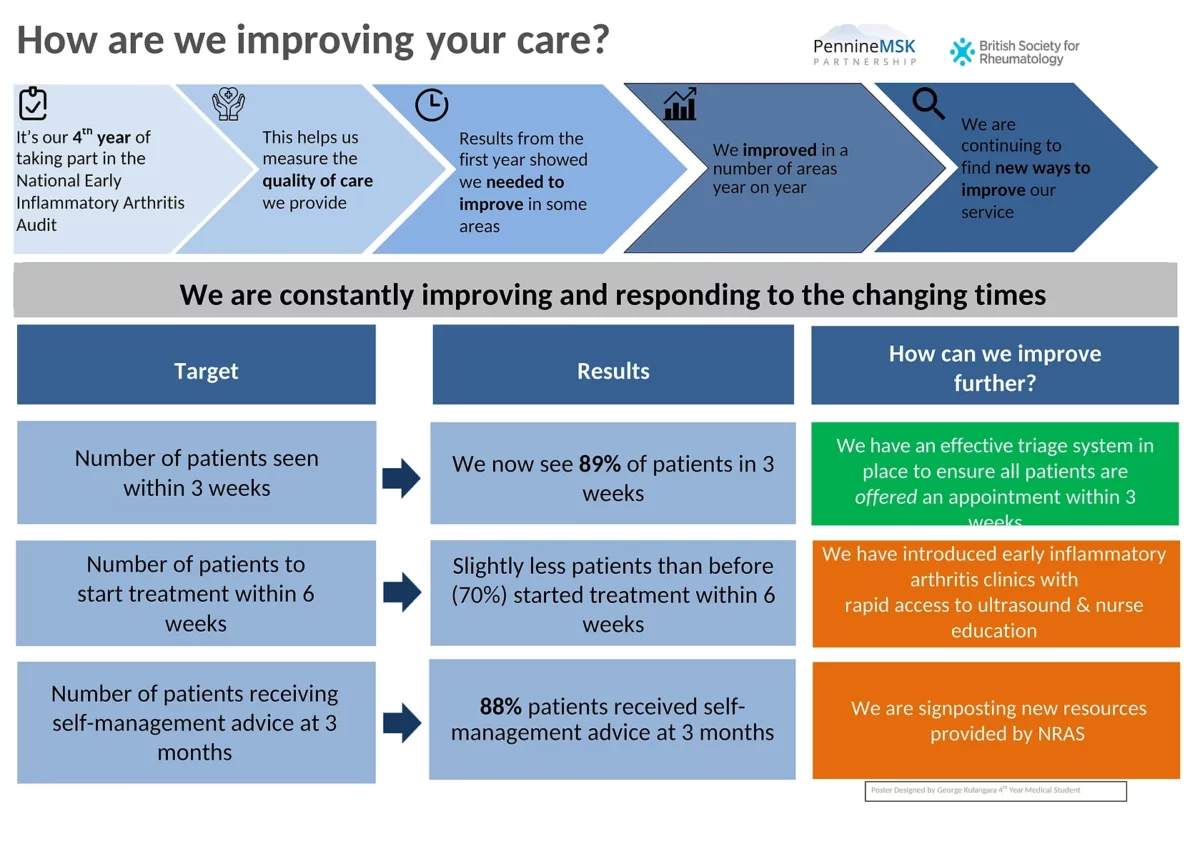Research and Audits
Pennine MSK Partnership works with the research arm of the NHS, the National Institute for Health Research, to promote clinical research and offer our patients the opportunity to take part in ethically approved research studies. Research has always been at the heart of the NHS. Through research we are able to continually improve treatments and discover the best ways to prevent, diagnose and manage illnesses. It also helps us understand how best to focus NHS resources where they will be most effective. As a patient, you may at times be offered the opportunity to be involved in research studies which Pennine MSK Partnership has agreed to support. Our level of involvement may range from simply identifying potential participants and informing them about a study for an external researcher, to being a site where research activity is carried out.
Click to see how we support NHS Research and how you can help and get involved.

National Registers
National Early Inflammatory Arthritis Audit
The National Early Inflammatory Arthritis Audit has been commissioned to help understand and improve the quality of care for people with arthritis. The project collects information on people referred to rheumatology units with a possible arthritis. This is an opportunity to contribute to a national study which will shape the scope of inflammatory arthritis treatment in the future, and help improve referrals and treatment for the next generation. Pennine MSK will provide information about your care over the first 3 months after you have been diagnosed. In addition, you are asked how arthritis is affecting your life. This is in the form of an online questionnaire (paper format available if preferred) If you want to know how NEIAA use and protect your information please see the privacy policy here.
For additional information please click here.
Fracture Liaison Service Database (FLS-DB) national audit
Breaking a bone after a fall is a common injury. Caring for patients with these broken bones or fractures and preventing future fractures is an important part of the work of the NHS. Pennine MSK participate in this national clinical audit which gathers information about fracture care, treatment and referrals and measures local performance against national and professional standards and provides regular feedback to health professionals. This information enables Pennine MSK and our partners to review their performance against national standards and focus on areas where they can make improvements to patient care.
The aim of this audit is to improve the care of patients who are at risk of a fragility fracture or osteoporosis. A ‘fragility’ fracture is a broken bone that happens after a fall from a standing height or less. Fragility fractures often affect the larger bones of the body such as the back, hip or wrist. Bones are strong and usually don’t break from a simple fall, but as we get older our bones become weaker. Osteoporosis and other bone diseases can increase this effect of age, and further weaken bones. This means that even a low-impact fall from a standing height can cause a broken bone. Patients who have suffered a fragility fracture are at higher risk of breaking another bone; either the same bone again or another bone in the body. Fracture liaison services (FLSs) are teams of nurses, doctors, pharmacists and administrative staff who treat people (usually aged 50 and over) with fractures to reduce the chance of experiencing another broken bone.
Being part of the FLS-DB does not mean that you will be given different care or have your treatment options limited. The FLS-DB will just collect the details of what type of care you receive in order to understand how the FLS in your area identifies patients, investigates their individual circumstances, provides information to you and refers you to treatment if necessary. By collecting this information the FLS-DB can help the NHS understand how care is being implemented across the country and make sure that all patients are getting the best possible care.
If you want to know how we use and protect your information please click here to see the fair processing statement.
Research

British Society for Rheumatology Biologics Register (BSRBR)
The BSRBR-RA (British Society for Rheumatology Biologics Register – Rheumatoid Arthritis) is run by the Arthritis Research UK Epidemiology Unit at the University of Manchester. It tracks the progress of patients with severe Rheumatoid Arthritis (RA), who are receiving biologic agents and monitors the safety and effectiveness of these treatments over a long-term period. For more information refer to the BSRBR website here.

Outcome of Treatment in Psoriatic Arthritis Studies Syndicate (OUTPASS)
The OUTPASS Study aims to identify genes and other factors that predispose to the development of psoriatic arthritis and the long-term outcome of patients, including response to treatment. The study is being co-ordinated by the Versus Arthritis UK Centre for Genetics and Genomics, Centre Musculoskeletal Research at the University of Manchester and the Chief Investigator Dr James Bluett. Further details can be found at the Be Part of Research Website.

Remora 2 Trial
Pennine MSK are co-applicants on this £2.1.m research study funded by the National Institute for Health and Care Research (NIHR). The REmote MOnitoring of Rheumatoid Arthritis (REMORA) study has developed and is testing and evaluating a system for tracking daily symptoms in people living with rheumatoid arthritis (RA), where data are collected using a smartphone app and integrated into NHS electronic patient records. The aim is to improve outpatient consultations by making sure both health care staff and patients have detailed information on how patients have felt in the weeks and months between appointments. The study closed to recruitment in December 2024 and we are grateful to the patients and health care professionals who are using the smartphone app currently and providing feedback and information about how symptoms change over time.
More information care be found here:
https://sites.manchester.ac.uk/remora/
Or by contacting the Principal Investigator Dr Jill Firth: Jill.Firth@nhs.net or the study team at the University of Manchester: remora2@manchester.ac.uk



